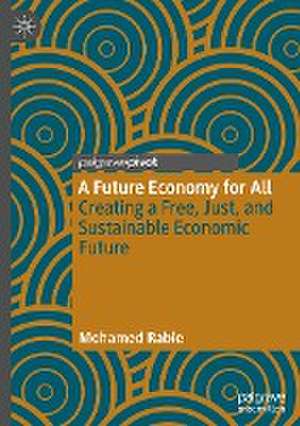A Future Economy for All: Creating a Free, Just, and Sustainable Economic Future
Autor Mohamed Rabieen Limba Engleză Hardback – 11 noi 2023
Written for a discerning audience of economists, policymakers, scholars, and students, the book shifts the paradigm of the knowledge age away from issues with power and toward a future that values justice, freedom, and sustainability. Readers will gain invaluable insights into reshaping our societies, fostering inclusive economic growth, and ensuring a better world for all.
Preț: 313.56 lei
Nou
Puncte Express: 470
Preț estimativ în valută:
60.08€ • 63.25$ • 49.59£
60.08€ • 63.25$ • 49.59£
Carte tipărită la comandă
Livrare economică 23 ianuarie-06 februarie 25
Preluare comenzi: 021 569.72.76
Specificații
ISBN-13: 9783031429569
ISBN-10: 3031429567
Ilustrații: VII, 179 p. 1 illus.
Dimensiuni: 148 x 210 mm
Greutate: 0.38 kg
Ediția:1st ed. 2023
Editura: Springer Nature Switzerland
Colecția Palgrave Macmillan
Locul publicării:Cham, Switzerland
ISBN-10: 3031429567
Ilustrații: VII, 179 p. 1 illus.
Dimensiuni: 148 x 210 mm
Greutate: 0.38 kg
Ediția:1st ed. 2023
Editura: Springer Nature Switzerland
Colecția Palgrave Macmillan
Locul publicării:Cham, Switzerland
Cuprins
1. Introduction.- 2. One Human Race; a Shared Destiny.- 3. Historical Background.- 4. Societal Processes of Change.- 5. Culture and Civilization.- 6. Materialism in Historical Perspective.- 7. Dynamics of Power, Wealth and Knowledge.- 8. Decline of Democracy and Capitalism.- 9. A Folk Political System.- 10. A Folk Economy.- 11. Inventing a New Education System.- 12. Education and Healthcare Systems.- 13 Sustainability.- 14. The Global Refugee Crisis.- 15. Liberating All Nations from the Debt Burden.- 16. Conclusion.
Notă biografică
Mohamed Rabie is President of the Arab Thought Council in Washington, D.C. Previously, he served as Professor of Economics at Georgetown University and Distinguished Professor of International Political Economy at the School of Governance and Economics in Rabat, Morocco. Rabie has published more than 60 books in English and Arabic and taught economics at universities across four continents. He is a fellow of Alexander Von Humboldt Foundation and a recipient of the State of Palestine Lifetime Achievement Award.).
Textul de pe ultima copertă
This book journeys through human history, beginning with the tribal age and ending with an option for what's to come after the knowledge age. It examines the profound influence that culture, civilization, and materialism have on the distribution of wealth, knowledge, and power. It critically examines the shortcomings of current education and healthcare systems, shedding light on the difficulties nations face in effectively addressing the needs of citizens and population including refugees. The author challenges the existing societal frameworks, advocating for the adoption of novel political and economic systems firmly grounded in the principles of justice, freedom, and equity. At the core of this is a folk-political system that values productivity and empowers workers and workforces to innovate.
Written for a discerning audience of economists, policymakers, scholars, and students, the book shifts the paradigm of the knowledge age away from issues with power and toward a futurethat values justice, freedom, and sustainability. Readers will gain invaluable insights into reshaping our societies, fostering inclusive economic growth, and ensuring a better world for all.
Written for a discerning audience of economists, policymakers, scholars, and students, the book shifts the paradigm of the knowledge age away from issues with power and toward a futurethat values justice, freedom, and sustainability. Readers will gain invaluable insights into reshaping our societies, fostering inclusive economic growth, and ensuring a better world for all.
Mohamed Rabie is President of the Arab Thought Council in Washington, D.C. Previously, he served as Professor of Economics at Georgetown University and Distinguished Professor of International Political Economy at the School of Governance and Economics in Rabat, Morocco. Rabie has published more than 60 books in English and Arabic and taught economics at universities across four continents. He is a fellow of Alexander Von Humboldt Foundation and a recipient of the State of Palestine Lifetime Achievement Award.
Caracteristici
Presents a new framework for sustainable economic and political systems Explores pressing social issues that influence current problematic dynamics across wealth, knowledge, and power Provides insight into the interplay of culture, civilization, and materialism from the tribal age to the knowledge age
